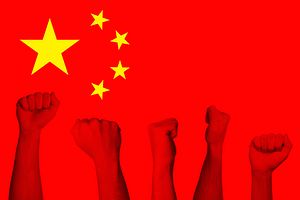They’ve been inciting indignation against the West for more than a year, but as China’s “wolf warrior” diplomats are urged to tone down the rage, they’re up against an unexpected source of opposition: nationalists at home.
In recent years, Beijing has unleashed a new breed of diplomats known as “wolf warriors,” a famous metaphor for militant nationalism inspired by a Chinese blockbuster film. Beijing has been under fire for concerns ranging from human rights abuses to guilt for the Covid-19 outbreak.
Western ministry spokesmen and officials abroad took a strong and outraged tone in defending the Communist-led country, including promoting conspiracy theories and openly insulting foreign colleagues.
President Xi Jinping, however, made a 180-degree flip this month, urging top political leaders to assist develop a “reliable, admirable, and respectable” worldwide image in order to boost China’s soft power. Officials and state media should work together to “better tell China’s stories,” he said. According to some experts, the remarks reflect Beijing’s growing recognition that years of inflaming nationalism at home have left it with limited room to engage in more intricate diplomatic manoeuvring.
While the shift reflects a “broader realisation at the top of the party that China’s recent diplomatic strategy… has not been well received abroad, including among potential allies,” according to Dr Florian Schneider of the Leiden Asia Centre in the Netherlands, the new approach necessitates a delicate balancing act. “China’s leaders have manoeuvred themselves into somewhat of a trap. On the one hand, they have promised the world a mild and benevolent China. On the other hand, they have promised domestic audiences a strong and assertive China.”
Officials and intellectuals who advocate for a more delicate message have been met with resistance from nationalists, leaving them conflicted between home and international audiences. This month, “patriotic” Chinese influencers on Weibo slammed prominent Chinese intellectuals who took part in a Japanese government-sponsored study exchange programme, calling them “traitors” for accepting Japanese money and blogging positively about Japan.
Beijing eventually intervened, describing the programme as a tool to “increase trust and deepen friendship” – in stark contrast to Weibo users who referred to one writer as a “Japanese running dog undeserving of sympathy.”
The online campaign against the exchange programme coincided with a visit by US senators to the democratic island of Taiwan to contribute coronavirus vaccines, to which the foreign ministry issued an unusually muted reprimand, prompting nationalist Internet trolls to mock it. “Why aren’t we shooting them down, they’ve violated our airspace!” one furious Weibo user wrote, a sentiment shared by a number of other users. “So weak and incompetent,” another lamented.
When it’s convenient for Beijing, it promotes nationalism, as evidenced by online campaigns this year calling for boycotts of foreign clothing labels that made statements about avoiding cotton from China’s Xinjiang region owing to claims of forced labour. Even China’s most ardent defenders have conceded that more restrained rhetoric would be more appropriate for the country’s claim to be a great power.
After a Communist Party-run Weibo account made a mocking comparison between a Chinese rocket launch and the cremation of Covid-19 victims in India, Mr Hu Xijin, editor of the nationalist tabloid Global Times, wrote last month that government social media accounts should “hold high the banner of humanitarianism.”
“Sometimes this ‘wolf warrior’ sentiment can get out of hand,” Dr Jonathan Hassid, a professor of political science at Iowa State University told Agence France-Presse (AFP). “(But) if China tries to soften its image, patriots at home will be furious. If it plays to the patriots, the world community reacts negatively.”
A shift in tone hasn’t translated into a shift in strategy. In the middle of this month, Beijing passed legislation allowing it to retaliate against enterprises that comply with foreign sanctions, and it has increased incursions into Taiwan’s air defence identification zone.
Last week, China made international headlines when a national security statute enacted by Beijing was used to shut down a popular Hong Kong tabloid that openly supported the city’s pro-democracy movement. The paper’s top executives, as well as its owner, Jimmy Lai, have been detained.
Beijing is wrestling with ambitions that are “in contradiction with one other,” according to Mr Adam Ni, an expert with the China Policy Centre in Canberra. “Beijing wants a better international image,” he told AFP. “But the domestic political drivers, as well as the need to assert its interests, means that it will continue to take actions that run in the opposite direction.”
China has been a belligerent nation and it has given rise to nationalistic values at home. The changed tone that is being pushed by Beijing and Xi Jinping has failed to inspire the Chinese masses who have become used to their nation’s aggressive rhetoric against criticism. Any attempt to curb the nationalistic sentiments will be viewed as a weakness of the CCP leadership and will be vehemently criticized. Jinping cannot afford to do so, but if China continues its wolf warrior diplomatic manoeuvres, it is bound to be left alone and isolated. A conundrum entails.
